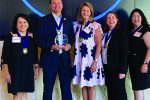Heritage Program in Luling helping older residents overcome isolation
By Kristen Meriwether, Editor LPR
If the pandemic has taught us nothing else, it’s shown us just how daunting isolation can be. For most of us not getting to see family and friends or go out and socialize on our terms has been a new concept to adjust to. But for Americans over the age of 60, isolation was already a very real issue, one further compounded by the pandemic.
At Ascension Seton Edgar B. Davis hospital in Luling, the Heritage Program has been addressing the issue of loneliness, depression, and anxiety that comes with aging. The Intense Outpatient Program (IOP) has been a lifeline for Caldwell County residents primarily age 60+ for over a decade.
“As you get older, your world shrinks, you are less and less engaged with people. That’s proven in the past 10 years or so to not be good for mental health.” Dr. Gayle Ayers, a psychiatrist and medical director for the program said in an interview with LPR Jan. 22. “You really need engagement with other people to maintain your cognition at a good level.”
The IOP is designed to help those who have not been able to find relief with medication prescribed by their primary care physician, and even those diagnosed with treatment resistant depression or anxiety.
“We get the tough cases where nothing has worked,” she said.
While the program does offer medication management, the real work is centered around group therapy sessions twice per week. Patients are given a personal therapist and they work to achieve goals towards healing.
“This is not daycare. We are not just there for socialization,” Dr. Ayers said. “The point is to teach people better coping skills, better coping strategies, better lifestyle habits.”
Dr. Ayers said patients in the program typically go for six months on average and attend a graduation ceremony upon completion. Patients have to use Medicare as their primary insurance.
“What we are looking for is when people can start to incorporate the things we are teaching and integrate those into their own lives and make lifestyle changes, make changes in how they are looking at the world,” Dr. Ayers said. “And that takes time.”
Overcoming the challenges of COVID were not easy. The patients are all in the group considered highest risk, but the need to connect in a group setting is critical for the success of the program.
They initially paused the program in March 2020 and Dr. Ayers, Program Manager Kym Fowler, and all of the therapists on staff immediately began working on a plan.
They knew not all of the older patients would be able to use Zoom as an option. For some patients it was not having access to the technology, for others it was not knowing how to use it, and for a population that was largely in a rural community, some simply didn’t have access to the internet speeds needed.
They made the decision to use a mixture of in-person and online sessions. They would still offer transportation from the home but limit the number of patients in each van. Everyone in the van is required to wear a mask, and everyone is screened prior to entry.
So far, the mixed sessions have worked. Dr. Ayers reported they have not had any COVID cases to date.
“It’s an honor to work with people who care so much about the patients,” Dr. Ayers said. “I have seen them really transform people.”




